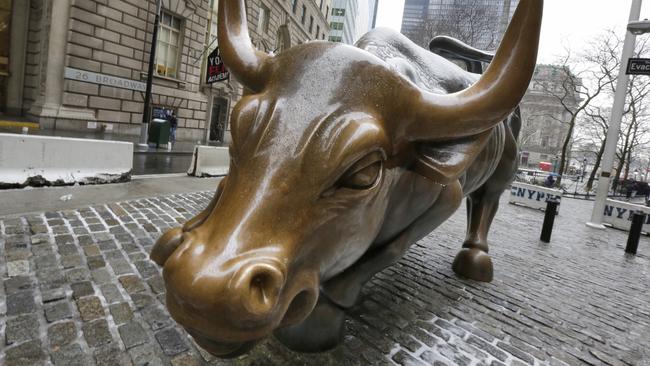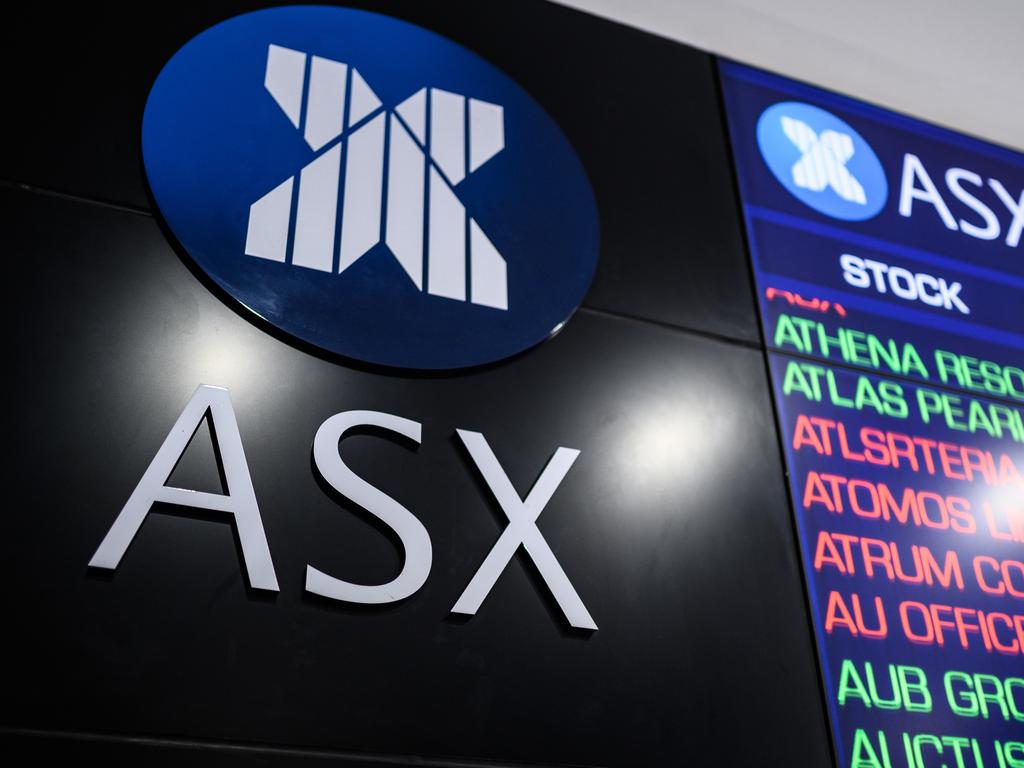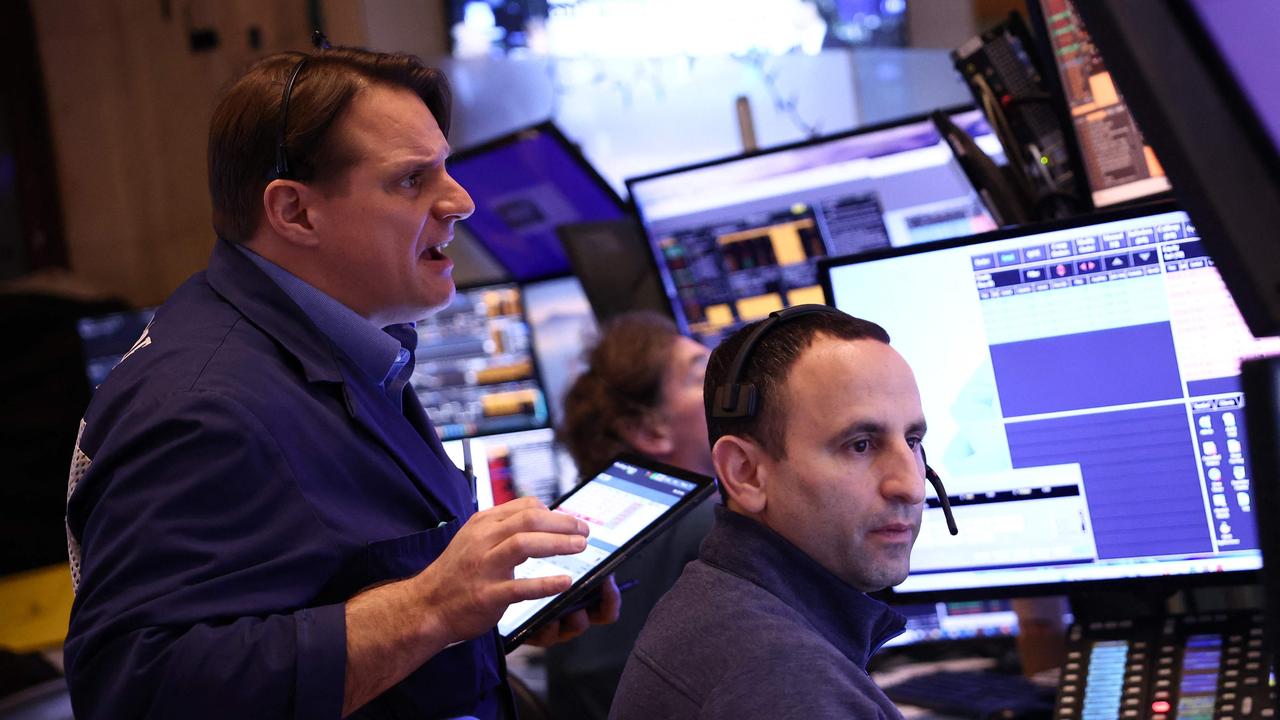Wall St ends shortest bear market in history
The Dow Jones’ 6.4 per cent gain starts a new bull market and marks the shortest bear market in the index’s history.

US stocks soared higher Thursday as the government came closer to approving a $US2 trillion stimulus package to combat the coronavirus pandemic, capping a three-day rally that has pushed the Dow Jones Industrial Average into a bull market.
The Dow industrials finished the day up 1351.62 points, or 6.4 per cent, to close at 22,552.17, launching the blue-chip index back into bull market territory. The jump ends an 11-day bear market for the index – the shortest in history for the index – which reached its bear-market low just three days ago.
The rapid plunge out of, and then back into, a bull market underscores just how volatile US stocks have become as the coronavirus pandemic ripples through economy. The Dow industrials are still down 21 per cent for the year, despite also climbing 21 per cent in the last three days.
The S&P 500 also ended the day higher, climbing 154.41 points, or 6.2 per cent to 2,630.07. The tech-heavy Nasdaq composite jumped 413.24 points, or 5.6 per cent to 7,797.54. Both indexes are still far from returning to a bull market.
Investors had been jittery leading up to the release of the latest weekly jobless claims data. Futures tied to US stocks had declined steeply earlier in the morning, yet pared their losses after it was announced that an unprecedented 3.28 million workers filed for unemployment benefits – five times the previous record high.
But stocks opened higher and remained in the green for the entire session as some investors were already looking ahead to the likely passage of the largest fiscal stimulus package in the US in recent memory.
The Senate on Wednesday approved the relief plan, which would provide direct payments to Americans and loans to large and small companies, among other measures. The House is expected to consider the bill Friday. If approved, it would head to President Trump.
“Investors believe data like today will make it more likely that the House will pass the stimulus bill,” said Jeffrey Kleintop, chief global investment strategist at Charles Schwab & Co. “The deeper and the worse the numbers are in the near term, the more possibility there is for a [fiscal] response, which powers the rebound on the other side.” Gains were broad Thursday with all 11 sectors of the S&P 500 finishing the day higher. Dow heavyweight Boeing Company surged 14 per cent on news that the stimulus package had set aside $US17 billion for businesses deemed critical for national security, which many have interpreted to include the aerospace giant, which is a defence contractor.
Many airlines also climbed after it became clear that they would receive relief. Alaska Air Group was among the large gainers in the S&P 500, rising 8.9 per cent.
The S&P 500’s energy sector also continued to march higher. Marathon Oil surged 8.4 per cent, Exxon Mobil edged up 4.1 per cent, and Chevron gained more than 10 per cent. Stocks in the sector had been particularly battered by weeks of market downturn, pushed lower, in part, by evidence that the pandemic is leading to an unprecedented decline in energy demand.
Still, oil prices slid Thursday. Brent crude, the global gauge of oil prices, dropped 3.8 per cent to $US26.34.
Despite widespread gains across equities Thursday, investors warned that the Dow’s rise into a bull market should be cautiously digested.
“It’s impressive in terms of per cent from the bottom,” said Anwiti Bahuguna, head of multi-asset strategies at Columbia Threadneedle Investments. “But we still have a big hill to climb back to the old high.” And, even as investors look ahead to the stimulus bill, there’s no guarantee that it will be enough to blunt the economic fallout from the coronavirus outbreak. US cases of the virus now surpass 70,000 people, and more than 1,000 have died. State and local governments have ordered millions of Americans to stay home to stop the spread of the highly contagious virus, further exacerbating the US economic dent.
Federal Reserve Chairman Jerome Powell said Thursday morning that he expected economic activity to decline “pretty substantially” in the second quarter. Mr. Powell, speaking in a rare television interview on NBC’s “Today” show, added that the central bank is taking unprecedented action to help ensure economic activity can resume as soon as the coronavirus pandemic is under control.
Many economists have been revising their US GDP projections, with some predicting that the US economy could in the second quarter shrink far worse than it did during the Great Recession. Other market observers have cautioned that the US stocks rally could likely be temporary – especially as more economic data emerges and the US likely remains weeks away from having the coronavirus under control.
Analysts also expect a sharp decline in corporate earnings in the month ahead. “The market is showing a little bit of relief, but frankly, that doesn’t mean that it’s going to persist,” said Solita Marcelli, deputy chief investment officer for the Americas at UBS Global Wealth Management. “We still have a lot of things that are unknown.” Investors moved into government bonds Thursday, causing the benchmark on the 10-year US Treasury to retreat to 0.806 per cent, from 0.854 per cent Wednesday.
Outside of the US, the pan-continental Stoxx Europe 600 finished the day up 2.6 per cent. Earlier, the European Central Bank “broke new ground,” said Florian Hense, an economist at Berenberg Bank in a note, after it gave itself more flexibility on its new €750 billion bond-purchase program.
Meanwhile, most major stock markets in the Asia-Pacific region closed lower. Japan’s Nikkei 225 lost 4.5 per cent. Singapore’s FTSE Straits Times Index shed less than 1 per cent after the country forecast that the economy could contract by up to 4 per cent in 2020 in its first full-year recession since 2001.
Dow Jones Newswires





